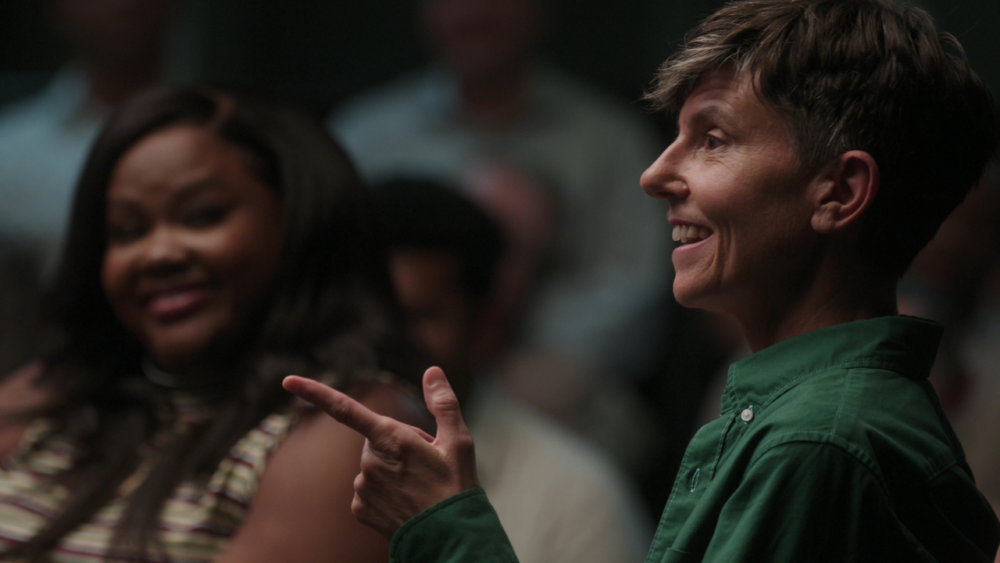[Note: This review contains discussion of sensitive subject matter including mental illness and suicide that may be triggering for some readers. Reader discretion is advised.]
Picture a therapy session attended by the likes of Mike Birbiglia, Nicole Byer, Gary Gulman, London Hughes, Tig Notaro, and Atsuko Okatsuka. Director Neil Berkeley’s documentary film, aptly titled “Group Therapy,” features the exact comedians as they talk about mental health and its connection with their professional journeys.
Through the frame of a group therapy session with the abovementioned comedians and moderated by Neil Patrick Harris, “Group Therapy” begins with a glaring statistic: that a million people commit suicide every year or, as the voiceover equates it, about 2,800 a day, and one every 30 seconds.
Enter the late great George Carlin — the source of the statistics and the voiceover — as he checks his watch, “There goes another guy.”
As Harris surveys the room, he finally addresses everyone, “Who wants to start?” In their group dialogue (as well as personal confessionals and stand-up clips), the comedians bravely reveal the connection between their professional and mental health journeys. As a revelatory exploration of the intersection between comedy and mental health, the film drives the point of the latter as a double-edged sword for some of the funniest people alive.

The Convergence of Comedy and Therapy
Comedy shares some striking similarities with therapy. Both involve a person opening themselves up to an audience, but there’s a crucial difference. In therapy, the goal is to provide information to a skilled professional who can guide the individual toward tools for addressing their issues. On the other hand, comedians often shy away from burdening their audience with their sorrows, anxieties, or traumas. Instead, they choose to share humor, honesty, and the shared human experience.
“Group Therapy” sees the comedians making a case for this convergence, as they share their personal experiences dealing with mental health struggles. We listen to one comedian discuss standing on the precipice of a building contemplating suicide during a bout of depression, or another who had to deal with her cancer diagnosis — just as her mom was dying and her partner breaking up with her. Other stories include being shamed for their bodies and their race, making it difficult for them to feel they belong in a world that doesn’t seem to understand them.
Despite these weighty topics, “Group Therapy” fortunately maintains an upbeat tone as the comedians explore how comedy has helped them cope with their struggles. Their ability to transform painful incidents into laughter proves cathartic, thus highlighting the power of humor as an additional lifeline alongside traditional medicine and therapy.
Delicately intertwining lighthearted humor and contemplative introspection, the film offers an emotionally impactful exploration of mental well-being. The comedians’ unique brand of wit serves as a powerful tool to initiate a crucial and much-needed dialogue.
[Related Review: The Documentary ‘unseen’ Delves into the Intersections of Immigration, Disability, and Mental Health]
‘Group Therapy’: An Uneven Attempt at an Exploration of Mental Health
The thing I find is the film’s ultimate weakness concerns its presentation. Based on its title alone, “Group Therapy” would have worked just fine, had director Berkeley constrained the entire conversations in that large-circle setup. But no, Berkeley and the filmmakers decided to present the comedians’ stories in other approaches, too.
Aside from the group therapy format that Harris moderated, the film also employed a one-person interview approach, as well as random conversations among the comedians. And to up the ante, the filmmakers elected to have the group session attended by a live audience.
While these are arguably minor quibbles considering the deeply personal anecdotes the comedians share, these mishmash of approaches can take the audiences out of the experience. As a result, the viewers get to see at least two versions of the comedians: one where we see them more open to the off-screen interviewer, and another where they’re too aware of the presence of a live audience and thus instinctively try to include them by resorting to jokes to make them laugh. Whereas the individual, audience-less scenes get more intimate stories from the subjects, the titular sessions provide anything but.
For a film that preaches the importance of honesty and candor of its subjects, that’s a little ironic.
Equal parts illuminating, emotional, and flat-out funny; “Group Therapy” points the floodlights straight to the need to talk about the state of mental health in our culture today, and how comedians are not exempt from the effects of it. I just wished it stuck to its guns and stayed faithful to the essence of its title.